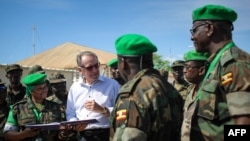The United Nations approval of the troop surge in Somalia will help the African Union’s goal of defeating hard line Islamic group al-Shabab in East Africa, according to Erastus Mwencha, the AU’s deputy chairman.
He said the strengthening of African Union troops (AMISOM) and support for the Somalia national army will make it possible to intensify the military campaign against the militants and expand the authority of the Somalia government. It will also facilitate the political process, which will culminate in the adoption of a federal constitution and the holding of elections.
Mwencha outlined the rationale behind the AU’s decision to seek the UN Security Council’s approval for a troops surge in Somalia.
“The reason for requesting this is that the [progress] that Africa had made in dismantling al-Shabab was starting to recede following al-Shaba’s regrouping in some of the areas the African forces had combed through,” said Mwencha. “We have also seen that al-Shabab was responsible for the attack that happened [last month] in Nairobi.”
Mwencha said the recent Westgate Mall attack in Kenya that left as least 67 people dead and scores injured shows the urgency of ending terrorism carried out by the group.
AMISOM has succeeded in driving out al-Shabab militants from the capital, Mogadishu and some surrounding areas, but the group still controls some southern parts of the country.
“There is need to contain al-Shabab and to clean up. There is need for an increased presence of African forces. So, we are grateful to the Security Council for acceding to this request, and we hope that deployment can take place soon. So [we hope] this resurgence of al-Shabab can be finished, but also continue to help Somalia gain its own capacity to take care of its own security,” said Mwencha.
The AU initially asked that its troops in Somalia be increased to 26,000. Mwencha said after consultations with the Security Council the force would be two or three thousand less than the number requested.
“We hope that if they are well equipped, they should be able to give support to the current forces and help finish the job,” he said.
Currently, there are about 17,731 AMISOM uniformed personnel including both troops and police, along with a Force Headquarters staff of 81. The military component has 5,432 troops from Burundi, 1,000 from Djibouti, 3,664 from Kenya, 850 Sierra Leone and 6,223 troops from Uganda.
Mwencha said the AU is satisfied with the UN’s decision to authorize an increase in AU troop strength in Somalia. He also underscored the importance of the surge and how it could thwart the militant group’s terrorist attacks.
“You’ve seen that there are training cells or camps inside Somalia and the challenge has been that even as the current forces in Somalia comb through [and liberate] some areas, the they don’t have enough capacity to continue to monitor and stabilize them,” said Mwencha.
“Stabilizing Somalia would mean strengthening the Somali forces, helping bring about reconciliation, and getting [the government] to focus on development issues, so that it can secure its own territory and its own capacity,” said Mwencha.
He said the strengthening of African Union troops (AMISOM) and support for the Somalia national army will make it possible to intensify the military campaign against the militants and expand the authority of the Somalia government. It will also facilitate the political process, which will culminate in the adoption of a federal constitution and the holding of elections.
Mwencha outlined the rationale behind the AU’s decision to seek the UN Security Council’s approval for a troops surge in Somalia.
“The reason for requesting this is that the [progress] that Africa had made in dismantling al-Shabab was starting to recede following al-Shaba’s regrouping in some of the areas the African forces had combed through,” said Mwencha. “We have also seen that al-Shabab was responsible for the attack that happened [last month] in Nairobi.”
Mwencha said the recent Westgate Mall attack in Kenya that left as least 67 people dead and scores injured shows the urgency of ending terrorism carried out by the group.
AMISOM has succeeded in driving out al-Shabab militants from the capital, Mogadishu and some surrounding areas, but the group still controls some southern parts of the country.
“There is need to contain al-Shabab and to clean up. There is need for an increased presence of African forces. So, we are grateful to the Security Council for acceding to this request, and we hope that deployment can take place soon. So [we hope] this resurgence of al-Shabab can be finished, but also continue to help Somalia gain its own capacity to take care of its own security,” said Mwencha.
The AU initially asked that its troops in Somalia be increased to 26,000. Mwencha said after consultations with the Security Council the force would be two or three thousand less than the number requested.
“We hope that if they are well equipped, they should be able to give support to the current forces and help finish the job,” he said.
Currently, there are about 17,731 AMISOM uniformed personnel including both troops and police, along with a Force Headquarters staff of 81. The military component has 5,432 troops from Burundi, 1,000 from Djibouti, 3,664 from Kenya, 850 Sierra Leone and 6,223 troops from Uganda.
Mwencha said the AU is satisfied with the UN’s decision to authorize an increase in AU troop strength in Somalia. He also underscored the importance of the surge and how it could thwart the militant group’s terrorist attacks.
“You’ve seen that there are training cells or camps inside Somalia and the challenge has been that even as the current forces in Somalia comb through [and liberate] some areas, the they don’t have enough capacity to continue to monitor and stabilize them,” said Mwencha.
“Stabilizing Somalia would mean strengthening the Somali forces, helping bring about reconciliation, and getting [the government] to focus on development issues, so that it can secure its own territory and its own capacity,” said Mwencha.





